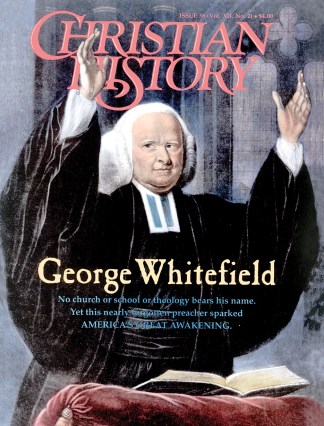George Whitefield, 1714-1770
1714 Born in Gloucester, England, December 16.
1716 Father, Thomas, dies.
1722 Mother, Elizabeth, marries Capel Longden, an ironmonger, who seizes control of the family tavern (The Bell Inn).
1726 George enrolls at St. Mary de Crypt grammar school, where he enjoys reading plays and acting. Later drops out to help his mother with the inn.
1728 George’s mother leaves her husband. Family conflicts cause George to leave the Bell Inn and cease “drawing wine for drunkards.”
1730 Returns to his studies at St. Mary’s. On Christmas, receives the Lord’s Supper for the first time and determines to be more watchful over his thoughts, words, and actions.
1732 Enrolls at Pembroke College, Oxford University. Pays expenses by working as a servitor (errand boy for other students). Begins praying three times a day and fasting weekly.
1733 Invited to breakfast by Charles Wesley and introduced to the Holy Club’s 10 or 11 earnest members. Borrows from Wesley The Life of God in the Soul of Man by Henry Scougal, which “showed me that I must be born again, or be damned!”
1734 Like his Holy Club friends, seeks salvation through severe discipline and good works, which causes a breakdown of his health from which he never fully recovers.
1735 Following five years of penitence, Whitefield becomes first of the Oxford methodists to experience “a full assurance of faith broke in upon my disconsolate soul!” Begins evangelizing, with converts organized into a society.
1735 Leads the Holy Club (the Wesleys had become missionaries to Georgia). Completes his degree, is ordained a deacon in the Church of England, and preaches his first sermon. Returns to Oxford to pursue graduate studies, but then leaves to substitute preach for various friends. Decides to become a missionary to Georgia.
1737 While voyage is delayed, his preaching electrifies Bristol and London; thousands pack churches to hear him. Publishes six sermons, while opponents publish against him.
1738 Spends three months in Georgia.
1739 Ordained a priest but finds many pulpits are now closed to him. Begins preaching outdoors, and soon tens of thousands hear of Christ in the fields. Some nobility, including the countess of Huntingdon, are drawn to Whitefield. In August, sails for America and preaches to throngs in New York and Philadelphia. Meets Ben Franklin.
1740 In Georgia, selects a site for Bethesda, his orphanage, and preaches at every opportunity. April: Preaches in northern cities like Philadelphia and small towns like Fagg’s Manor, where 12,000 hear him. Midyear: Back in Georgia. Fall: Preaching tour takes New England by storm.
1741 Arriving in England in March, meets with great hostility, stirred largely by John Wesley’s attacks against his Calvinism. Publishes a counterattack against Wesley. Preaches extensively in England, Scotland, and Wales. Nov. 14: Marries widow Elizabeth James.
1742 Itinerates in several parts of England. June: Begins five months of ministry in Scotland, and his sermons are “attended with much power” and often “a very great but decent weeping.”
1743 Helps form the Welsh Calvinistic Methodist Association, serving as first moderator.
1744 His 4-month-old son, John, dies of sickness and is buried February 8. George is attacked in bed and almost killed. August: Sails with his wife for America, arriving desperately ill in October, but soon resumes preaching.
1745-1748 Whitefield’s third visit to the Colonies, though beset with opposition, inspires a great wave of revival. In early 1748, ministers for a month or two in Bermuda.
1748-1751 Lady Huntingdon appoints Whitefield her chaplain, lessening financial perils of his work. Whitefield ministers throughout England, Wales, Ireland, and Scotland, with extended ministry at the Moorfields (London) Tabernacle. Persecution slackens.
1751-1752 Fourth visit to the Colonies, arriving in Georgia in October with a group of destitute children. Cancels plans for an extensive preaching tour when the Orphan House’s financial needs send him hurriedly back to England.
1752-1754 Tours Wales, visits Edinburgh for the seventh time, and returns to London for the opening of a new, brick Tabernacle.
1754-1755 Fifth trip to the Colonies, with preaching from Boston to Georgia. Sept. 1754: Receives honorary M.A. from the College of New Jersey (now Princeton).
1755-1763 Preaches often in London, as well as in Bristol, Gloucester, Edinburgh, Dublin, Glasgow, many places in Wales, and countless towns and villages. Travels briefly to Holland for his health.
1763-1765 Sixth trip to the Colonies. Weak in health, ministers with difficulty in New York, Boston, and other places, generally with greater acceptance than ever.
1765-1769 Devotes attention to London ministries, also traveling to Edinburgh and elsewhere. August 1768: Wife, Elizabeth, dies. Visits Trevecca, Wales, to help open Lady Huntingdon’s College.
1769-1770 Seventh and final trip to the Colonies is a difficult voyage. Arrives in Charleston and preaches for 10 days to large congregations. May 1770: Begins tour from Philadelphia, preaching as often as his frail body permits. Sept. 29: In New Hampshire, preaches final sermon and dies the following morning. Some 6,000 gather for funeral
Whitefield’s World
1718 Blackbeard the Pirate beheaded
1727 George II becomes king of England
1729 Ben Franklin begins Pennsylvania Gazette
1733 Georgia, last of 13 colonies, settled
1742 Handel’s Messiah
1755 George Washington leads British forces in French and Indian War
1758 First Indian reservation
1770 Boston Massacre
Richard Owen Roberts is president of International Awakening Ministries in Wheaton, Illinois, and author of Whitefield in Print: A Bibliographic Record (Richard Owen Roberts, 1988).
Copyright © 1993 by the author or Christianity Today/Christian History magazine.Click here for reprint information on Christian History.










